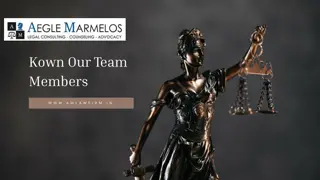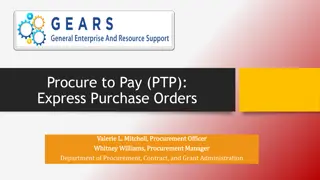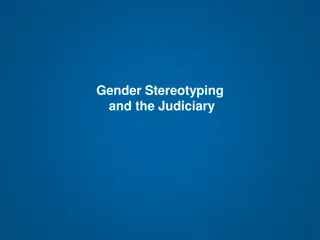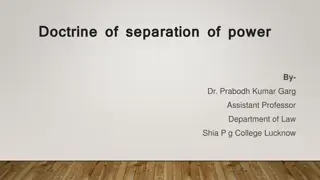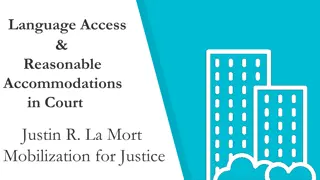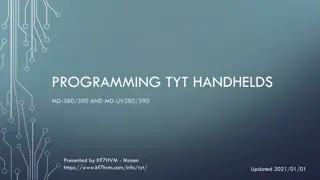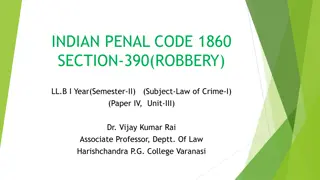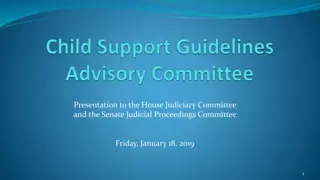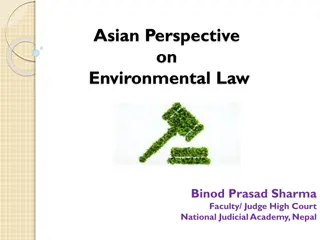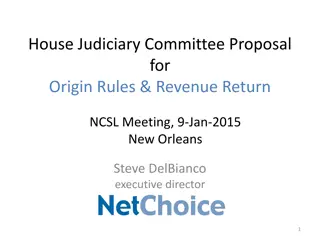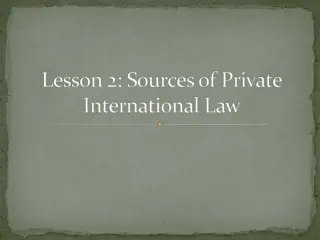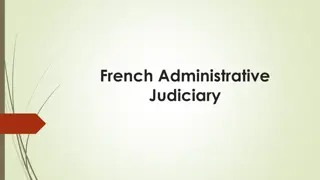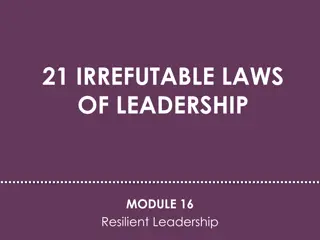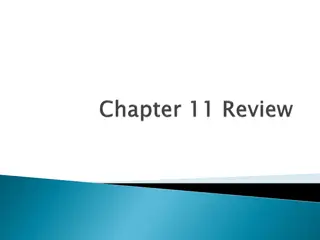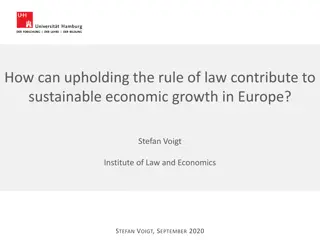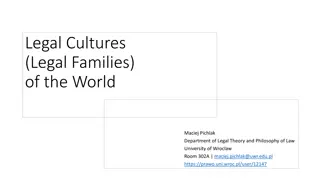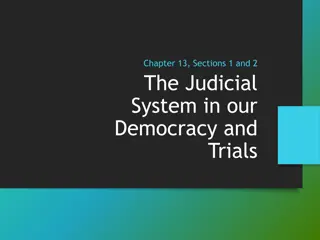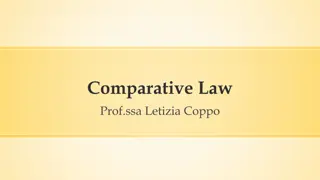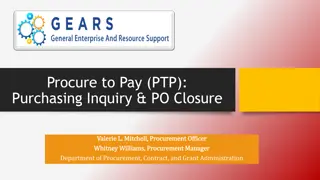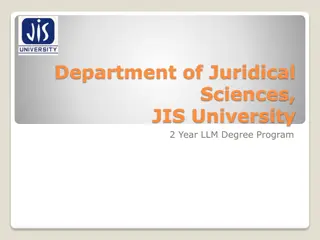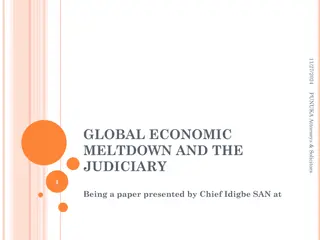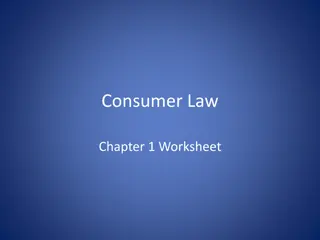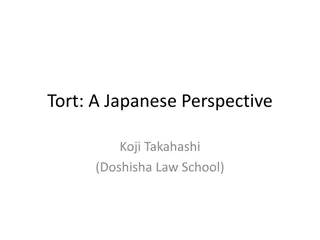Konw about our team
Know About Our Team:\nMr.Bageerathan\nMr. Bageerathan is a distinguished legal professional with a rich background spanning over 16 years in the legal field. He earned his Law degree from University Law College and further enhanced his legal acumen by obtaining Dual Masters degrees in Law (LL.M) fro
0 views • 4 slides
Understanding the Different Organs of the State in Bangladesh
Explore the roles and functions of the Executive, Legislature, and Judiciary in the state of Bangladesh. Learn about the formation of the Executive branch, the significance of the President and Prime Minister, and the interrelation between the Executive, Legislature, and Judiciary. Gain insights int
1 views • 38 slides
Judiciary Procurement Processes Overview
The Judiciary's Department of Procurement, Contract, and Grant Administration (DPCGA) manages the procurement of goods and services, utilizing Corporate Purchase Orders and Express Purchase Orders to streamline the process. This includes creating, canceling, and changing Express POs in accordance wi
0 views • 18 slides
Austin's Theory of Law by Rinkey Sharma: An Overview
Austin's Theory of Law, presented by Rinkey Sharma, delves into the Imperative Theory of Law as proposed by Austin, known as the father of English jurisprudence. It explores General and Particular Jurisprudence, Austin's definition of law, and the elements of positive law, emphasizing the concepts o
0 views • 11 slides
Gender-based Violence Against Women in the Judiciary
Gender-based violence against women refers to violence directed at women because of their gender, encompassing physical, mental, and sexual harm, coercion, and deprivation of liberty. The judiciary plays a crucial role in addressing wrongful gender stereotyping in gender-based violence cases to ensu
0 views • 16 slides
Understanding the Doctrine of Separation of Power by Dr. Prabodh Kumar Garg
The doctrine of separation of power, as elucidated by Dr. Prabodh Kumar Garg, emphasizes the distinct roles of the executive, legislative, and judiciary branches to maintain checks and balances in governance. Originated by Montesquieu, this principle safeguards against tyranny and ensures liberty by
0 views • 27 slides
Language Access & Reasonable Accommodations in Court
Explore the importance of language access and reasonable accommodations in court settings, detailing laws such as Judiciary Law 390 and Uniform Rules for NY State Trial Courts Part 217. Discover top non-English languages used in court, in-person translation services, and how to report interpretation
0 views • 23 slides
Overview of Programming and Software for TYT Handheld Radios MD-380/390 and MD-UV380/390
Detailed information on models and limitations, stock software features, third-party software options such as EDITCP and N0GSG Contact Manager, general settings configuration, and the importance of manual programming for TYT handheld radios MD-380/390 and MD-UV380/390. The content covers programming
2 views • 20 slides
Understanding Gas Laws: Boyle's, Charles', Gay-Lussac's, and Avogadro's Laws
Gas laws such as Boyle's Law, Charles' Law, Gay-Lussac's Law, and Avogadro's Law govern the behavior of gases under different conditions. Boyle's Law relates pressure and volume at constant temperature, Charles' Law relates volume and temperature at constant pressure, Gay-Lussac's Law relates pressu
1 views • 19 slides
Understanding Section 390 of the Indian Penal Code on Robbery
Section 390 of the Indian Penal Code discusses the concept of robbery and its elements of theft and extortion. It outlines that robbery involves imminent danger or the use of violence, and the offender voluntarily causes harm or induces fear to commit the crime. The section also provides explanation
0 views • 7 slides
Enhancing Judicial Capacity for Environmental Law: Curriculum and Challenges
Environmental law curriculum for judicial education emphasizes the importance of knowledge and expertise in handling environmental justice issues. Prerequisites include competent rule of law, mature judicial system, independent bar, and well-equipped enforcement agencies. To address challenges faced
0 views • 18 slides
Evolution of Trust Law in Malta
Malta, with a unique legal system integrating civil and common law concepts, has evolved its trust law over the years. The concept of trust was gradually adopted, culminating in full integration into domestic law post-2004. Recent amendments have further solidified the legal framework, bridging the
4 views • 150 slides
Understanding the Rule of Law and Legal Systems in Wales and England
The content discusses the nature of law, the Welsh and English legal systems, and the Rule of Law doctrine. It includes observations from the 2019 AS Law Unit 1 examination, emphasizing the importance of adhering to rubrics and answering questions clearly. Candidates faced challenges with timing and
0 views • 14 slides
Presentation to Judiciary and Senate Committees on Maryland Child Support Guidelines
Introduction, purpose, committee members, quick history of Maryland guidelines, income shares model, and 2016 quadrennial review presented to the House Judiciary Committee and Senate Judicial Proceedings Committee to discuss current issues, proposed solutions, and legislative considerations regardin
0 views • 38 slides
Contrasting Legal Systems Around the World
Explore the diverse legal families globally, such as Civil Law (Romano-Germanic) and Common Law (Anglo-American), along with their historical backgrounds, sources of law, and dominant ideologies. Delve into the distinctions between Civil Law and Common Law, their origins, development, and practical
0 views • 17 slides
Understanding General Criminal Law: Principles and Relationships
General Criminal Law encompasses rules governing offenses and their penalties, exploring the definitions of offenses, relationships with social sciences, other branches of law, and auxiliary sciences. This presentation covers the importance, sources, and branches of criminal law, highlighting its in
1 views • 230 slides
Understanding Combined Gas Law and Ideal Gas Law for Final Exam Preparation
Explore the concepts of Combined Gas Law, Boyle's Law, Charles's Law, Gay-Lussac's Law, and their reflection in the Ideal Gas Law. Learn how to solve problems using these laws, prepare for your final exam scheduled for Tuesday, December 12 at 12:30 in the specified room. Dive into in-class practice
1 views • 23 slides
Overview of UK Law: Statute Law, Common Law, Criminal Law, Civil Law
Statute Law is written law created through the parliamentary process, forming the basis of the legal system. Common Law, on the other hand, is unwritten law based on judicial decisions and precedents. They govern different aspects such as civil and criminal matters, each with its unique characterist
0 views • 15 slides
Understanding Moral and Constitutional Values in Relation to Judiciary
Explore the concepts of moral values and constitutional values, emphasizing their importance in decision-making processes and societal norms. Discover the stages of moral development and delve into constitutional values such as sovereignty, socialism, secularism, democracy, justice, liberty, equalit
0 views • 9 slides
Perspectives on Environmental Law in South Asia
The judiciary in South Asian countries like India, Pakistan, and Bangladesh plays a vital role in upholding environmental justice and promoting sustainable development. These judiciaries have interpreted constitutional rights to include a healthy environment, leading to landmark decisions that integ
0 views • 15 slides
House Judiciary Committee Proposal for Origin Rules & Revenue Return
House Judiciary Committee proposes principles for interstate taxation, focusing on tax relief, simplicity, tech neutrality, tax competition, states' rights, and privacy. It discusses implementing origin sourcing and a multistate compact to ensure fair taxation for online sales. The compact incentivi
0 views • 13 slides
Development of Legal Education and Rule of Law in Somalia
Explore the establishment and evolution of legal education, rule of law, and governance structures in Somalia. Delve into the roles of institutions like the Parliament, Executive, and Judiciary in shaping the legal framework and upholding justice and accountability. Investigate the interplay between
0 views • 62 slides
International Law Programs 2021: E-Castle Updates and Course Offerings
Explore the online programs offered by the International Law Programs in 2021 at the E-Castle. Discover the benefits, courses available, program dates, instructor insights, and more. From International Business Law to Public International Law, gain valuable knowledge and networking opportunities in
0 views • 21 slides
Judicial Conduct and Ethics in the Legal System
Discussion on the appropriate conduct of judges in public, campaign photos, and speaking engagements about judicial activism within the legal system. Exploring the guidelines set forth by the Judiciary Code for judges' behavior and activities to maintain integrity and independence in the judiciary.
0 views • 22 slides
The Continuing Relevance of English Law to Irish Corporate Law Reform
English Law remains relevant in Irish corporate law reform, impacting areas like takeover regulation, deferred prosecution agreements, schemes of arrangement, and the comply or explain approach. The influence of English law is seen where there is no EU law dimension or when EU legislation allows mem
0 views • 10 slides
Understanding Private International Law: Key Principles and Treaty Regimes
This lesson delves into the sources, key principles, and treaty regimes of private international law. It covers jurisdictional competence, conflicts of law, recognition of foreign judgments, Canadian common law vs. Quebec civil law, Hague Conventions, and the United Nations Convention on Contracts f
1 views • 14 slides
Evolution of the French Administrative Judiciary System
Explore the rich historical development of the French Administrative Judiciary system from the pre-revolutionary period to modern times. Learn about key events such as the French Revolution, the creation of specialized courts, and the types of disputes handled by the administrative judiciary. Discov
0 views • 27 slides
Classification of Law: Understanding Different Types and Functions
Exploring the classification of law is essential for understanding the diverse nature of legal systems. This overview delves into domestic law vs. public international law, public law vs. private law, and the sub-divisions within public law, such as constitutional, administrative, and criminal law.
0 views • 19 slides
Laws of Leadership: Resilient Leadership Module
Explore the 21 Irrefutable Laws of Leadership Module on Resilient Leadership, covering essential principles such as the Law of the Lid, Law of Influence, Law of Process, Law of Navigation, Law of Addition, and Law of Solid Ground. Navigate through phases of leadership growth, learn to add value, bui
0 views • 37 slides
Overview of Legal Systems and Roman Law Development
Legal systems play a crucial role in governing societies, with Roman Law, Common Law, Civil Law, and Religious Law being some of the major types worldwide. Roman Law, focusing on private law, has influenced legal traditions in various regions, especially in Europe. Contrasting Common Law and Civil L
0 views • 26 slides
Political Events and Challenges in Early 19th Century America
Jefferson's election, Burr as VP, and the peaceful transfer of power marked a significant period. The Judiciary Act of 1801 and Marbury vs. Madison case highlighted the role of the Judiciary. Jefferson's dilemma with the Louisiana Purchase, Burr's controversial actions, and America's struggles betwe
0 views • 11 slides
Upholding the Rule of Law for Sustainable Economic Growth in Europe
Democracy and the rule of law are essential for sustained economic growth in Europe. The rule of law ensures stable and impartial enforcement of rules such as property rights and contract law, key for market economies. Upholding the rule of law is crucial for combating corruption and maintaining a f
0 views • 6 slides
Comparative Analysis of Legal Families Around the World
Explore the diverse legal cultures and families existing globally, including Civil Law, Common Law, Far East, Islamic, Hindu, and more. Learn about the historical background, methods of reasoning, institutions, sources of law, and dominant ideologies that characterize each legal family. Delve into t
0 views • 17 slides
Understanding the Judiciary and Trial Courts in a Democracy
Learn about the judiciary's role in democracy, including principles like judicial review and independence. Explore the function of trial courts, the trial process, and the importance of juries in resolving legal disputes.
0 views • 22 slides
Evolution of English Law: Historical Origins and Formation
The historical origins and formation of English law trace back to the Medieval period, characterized by Norman conquest, feudalism, and a strong central royal authority. The organization of the judiciary system and the development of procedural rules played pivotal roles in shaping English law. The
0 views • 30 slides
Judiciary Procurement Department Overview
The Procure-to-Pay process in the Judiciary's Department of Procurement involves various stages such as Purchasing Inquiry, PO Reconciliation, and PO Closure managed by officers like Valerie L. Mitchell and Whitney Williams. The department is responsible for procuring goods and services according to
0 views • 12 slides
2-Year LLM Degree Program in Juridical Sciences at JIS University
Explore the 2-year LLM degree program offered by the Department of Juridical Sciences at JIS University, specializing in Corporate Law, Criminal Law, and Constitutional Law. The program covers a range of specializations such as Comparative Criminal Law, Human Rights, Corporate Law, Competition Law,
0 views • 7 slides
Global Economic Meltdown and the Role of the Judiciary - A Critical Analysis
Chief Idigbe SAN presents a paper on the global economic meltdown and its impact on the judiciary, focusing on causes, effects, and solutions. The paper delves into the subprime mortgage crisis in the United States, deregulated banking sectors, and the responsibilities of judicial officers. It addre
0 views • 16 slides
Understanding Consumer Law: Enactment and Application of Laws
This comprehensive worksheet delves into the different types of laws such as Constitutional Law, Statutory Law, Administrative Law, Case Law, and Ordinances. It provides insights on who enacts these laws and explores scenarios to determine the type of law that would likely apply. Enrich your knowled
0 views • 19 slides
Japanese Tort Law: Choice of Law Rules and Double-Actionability
Japanese tort law follows specific choice of law rules, determining the applicable law based on factors such as the place of injury, product liability, and defamation. The double-actionability rule ensures that the harmful act is also unlawful under Japanese law and that remedies are available. This
0 views • 14 slides
